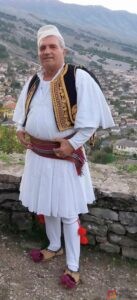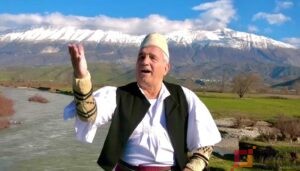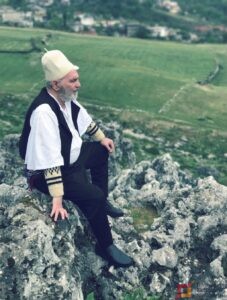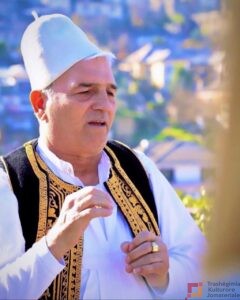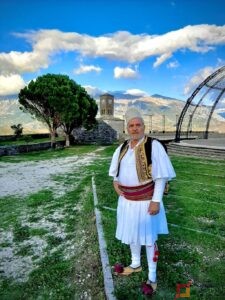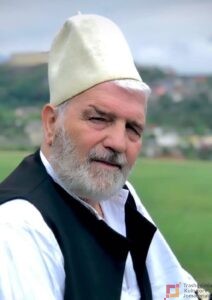Logatja (monophonic song) is a centuries-old, musical ritual, a sort of mumbling-like singsong or chanting shepherds practice while alone accompanying their flock of goats or sheep, during the time when the cattle is scattered and grazing. The lullaby is also a kind of logatja. In these provinces, “weeping with lamentations” of women in the events of deaths in the family is also considered logatje, or in the events of mourning ritual performed by vajtoret (female professional mourners) in ksodhe (mortuary procession). Logatje-s are also sung by rural women when doing specific time-consuming or “for leisure” work, such as loom weaving of carpets and runner rugs, when spinning wool on a furkë or llanar (spinning fork or forked distaff), when knitting socks or sweaters, when kneading the bread dough in the trough, when hanging tobacco leaves on the laths, when stirring/beating the dybek (milk churn), and so on.
Men’s and women’s logata is typically an iso-polyphonic singsong, of “lapçe vënçe” mode, but it is not sung in a group, rather, it is a single person, who sings all melodic lines of the polyphony. In logatje, the singer is the one who starts the song or takes it as well as the one who returns the song or picks it up; otherwise, a single voice sings the first part interweavingly, sings the second part, throws the third part and holds the iso voice or drone part. In performing logatje, the singer switches over all these roles quite plainly, “as deemed convenient”.
The lyrics of this mode of singing is usually taken from verses of popular polyphonic songs sung by a group, but also from verses prompted by the spirit of the moment while the singer is just singing.
Logatja is an ancient folkloric, cultural and artistic element. Some of the masterfully created pieces of music, have also been performed at festivities, celebrations, feature films, and local and national folk festivals. Worth mentioning among them, are: performances by Zeqo Hoxha from Kallarati province, Xhevat Avdalli from Palorto of Gjirokastra, Arjan Shehu from Dunavati of Gjirokastra, Roland Çenko from Shtatë krojet e Gjirokastrës, and so on.
In ethnomusicological research, several terms refer to logatje : “single-voice polyphony”, “monophony”, “hidden polyphony”, “lullaby”, “cradle song”, “weeping with lamentations”, “lamenting with strangers”, etc. Sometimes, ethnomusicologists consider logatje (monophony) as the first “cell” of iso-polyphony. In this course, other voices have been added to the single-voice song.


